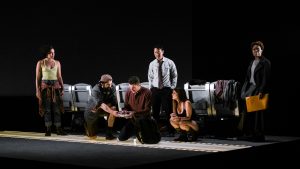Truth On A Train In ‘The Coast Starlight.’ Luminous La Jolla Playhouse Premiere
The Coast Starlight, now in its world-premiere display at the La Jolla Playhouse, resembles what used to be called “foxhole dramas”: A random handful of guys are tossed into enforced proximity with their survival depending on their ability to transcend differences and work together for a common cause.
The scene might be a boot camp, a lifeboat, a plane crash, even an elevator. What was important was the grinding process toward success and the lessons learned.
Keith Bunin’s play is an intriguing elaboration of that story structure. His random group, coach passengers on an express train northbound up the Pacific coast, don’t interact much at all. They share no goals and avoid mergers. The bulk of the play involves imaginary dialogues based on rudimentary exchanges. Yet somehow, all six of them go their ultimate ways with more hope than they brought aboard.

The cast of the La Jolla Playhouse world premiere of Keith Bunin’s The Coast Starlight includes, left to right, Camila Cano-Flavia, Rhys Coiro, Nate Mann, Rob Yang, Mia Barron and Stephanie Weeks. Jim Carmody Photo
A tipsy businessman. A soccer mom. A party girl, a fisherman and a young artist. And a sweetly bemused youth who opens the play musing on attachments he’s just cut and his fearful future. When the young artist arrives and pulls out her sketchbook, the exchanges begin, mostly individual imaginings of conversations that may not actually happen out loud.
And there’s the magic of Bunin’s play. Though it’s unclear who really says what, communication actually happens, and at a level poignant, sensitive and productive.
Each new arrival comes with some kind of introductory monologue to establish vividly their character. The adventuress loudly relates on her cell phone the details of being kicked out from a new-age retreat for not taking the mysticism seriously enough. (“Does she know we can hear every word?” somebody asks in frustration.) The business guy makes an ass of himself before confessing he’s dying of dreams denied and is taking the train because he’s, um, between drivers’ licenses. The mom is returning to safe suburbia after identifying the remains of a derelict brother who didn’t survive their frightful childhood.
The darkly brooding fisherman, heading to visit a deteriorating mother, also has done time as a carpenter and a bar-tender and he provides the bridge to the young narrator: Both of them have done military time in Afghanistan.
The others have problems which are part of most lives: career decisions, personal relationships, economic worries. But these two men share a poison hopelessly debilitating: time in a hell unknowable to the uninitiated. (Out of sincere respect, I won’t borrow from Bunin’s vivid evocations here. Just know that few, in today’s world of patriotic porn, have told truth more clearly.)
The play’s considerable impact is based firmly on the quality of these six characters’ exchanges, whether real or imaginative. When it’s their time to talk, they spill all in intimate detail. When they listen, they keep quiet and catch everything. Thus, the most memorable moments of the play – an elaborate happy ending scenario shaped and shared by all – is met by a profoundly moved audience with a solemnity near awe.
Based on a program note, the author seems to have done considerable time himself on the Coast Starlight train, listening, watching and imagining. The military insights seem to have come from bartenders. Amazing. But none of this would have been quite so powerful with the collaboration of director Tyne Rafaeli, who has cleared away the nonessential to make comfortable room for the essential and somehow drawn from her acting sextet a remarkable ensemble force.
This is a play that would have no chance as a film. The various levels of reality are simply unimportant given the bracing tonic of the intertwined stories and the visual images achieved by shuffling about set-designer Arnulfo Maldonado’s coach chairs. The director’s ability to project Bunin’s imagination without elaborate enhancement is prodigious.
Each actor brings a polished and profound individual to the mix. As the mysterious young man, Nate Mann is a wonder, compassionate, confused, vague but stalwart. Camila Cano-Flavia treats the role of the young artist like a rare flower needing tender care. Rhys Coiro, Mia Barron and Rob Yang have been kicked around enough, apparently, that their portraits of the fisherman, the tough gal and the self-loathing drudge, respectively, glow with life. And Stephanie Weeks has her own special glow as the mommy who made it out of the mean streets.
This is a play with something approaching a unique voice. The content becomes luminous in such a setting. It is customary when presented with such promising new work to say that one hopes to hear more. But this time I feel more strongly than ever that, with such artists in support, such a play suggests that the theatre is in good hands.
(Continues in the Potiker Theatre at UCSD at 7:30 p.m. Tuesdays and Wednesdays; at 8 p.m. Thursdays-Saturdays; at 2 p.m. Saturdays and Sundays; and at 7 p.m. Sundays through Sept. 15, 2019.)

Welton Jones has been following entertainment and the arts around for years, writing about them. Thirty-five of those years were spent at the UNION-TRIBUNE, the last decade was with SANDIEGO.COM.




A wonderful theater experience – great writing, great acting and imagination create a unique approach to story telling. We loved this play. We saw it a week ago today.
Please tell Mia Barron that we are the in-laws of an actor friend of hers who lives in New Jersey.